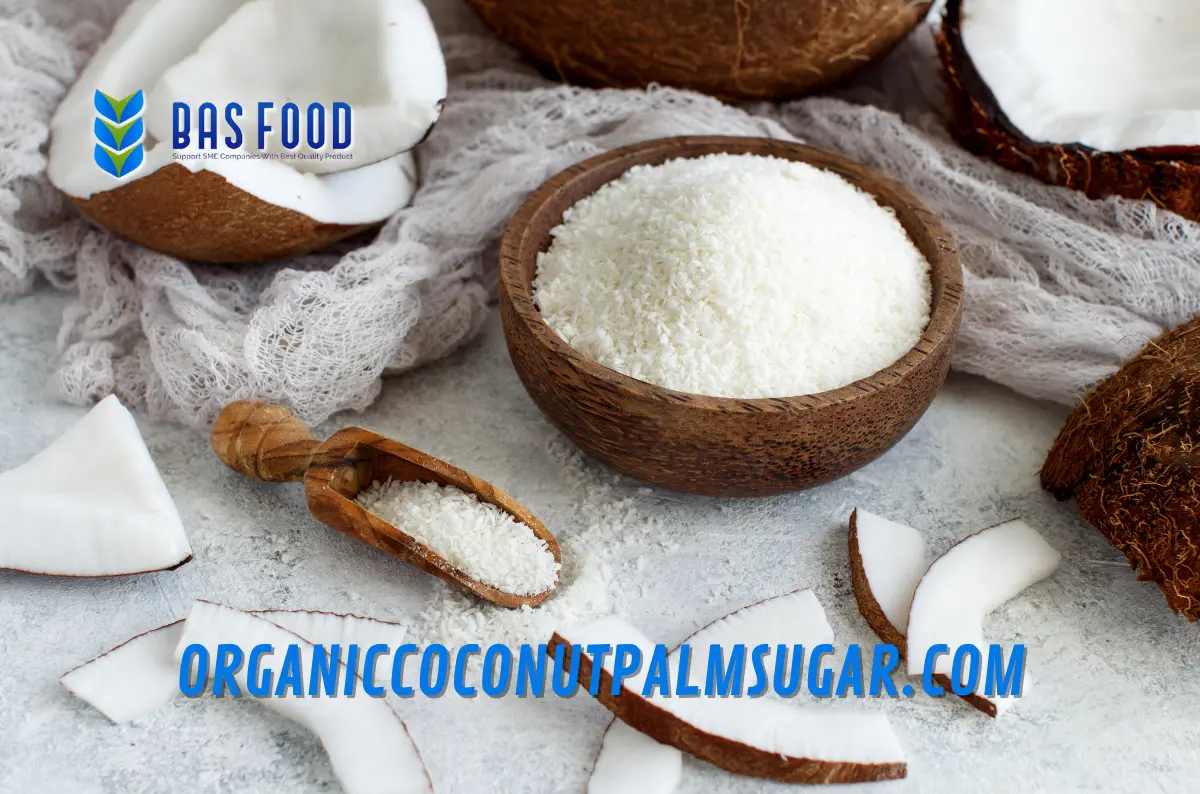Coconut flour has become a global favorite for healthy baking and gluten-free recipes. It’s rich in fiber, high in protein, and naturally aromatic. But have you ever wondered how coconut flour is made—from that tough brown shell to the soft, fine powder you find in stores?
This guide takes you inside the coconut flour process, showing how producers transform fresh coconuts into this versatile ingredient through sustainable, natural methods. You’ll also learn about the role of CV Bonafide Anugerah Sentosa, a trusted coconut and spices supplier from Indonesia, in supporting the global demand for high-quality coconut flour.

The Beginning: Choosing and Preparing Fresh Coconuts
Everything starts with quality coconuts. In coconut-producing regions like Indonesia and the Philippines, farmers select mature coconuts that are at least 11 to 12 months old. These are ideal because they contain less water but more meat—the essential part used to make coconut flour.
Once harvested, the coconuts go through an initial cleaning process to remove dirt, husks, and fibers. This stage ensures the coconuts are ready for hygienic processing. Quality control starts right here because even minor contamination can affect the final flour’s color and texture.
Afterward, workers split the coconuts open to remove the white flesh, also known as the kernel. The kernel is then grated or shredded, depending on the production method. This shredded coconut becomes the foundation for both coconut milk and coconut flour.
The Coconut Milk Extraction Stage
The next step in how coconut flour is made involves pressing the grated coconut to extract coconut milk. This step uses a mechanical press that separates the rich, creamy milk from the fibrous pulp. The coconut milk goes on to produce other products like coconut cream or virgin coconut oil (VCO), while the remaining pulp becomes the key ingredient for coconut flour.
This separation is vital because it defines the flour’s fat content. Since most of the oil is removed with the milk, the resulting flour is low in fat but still full of nutrients. It’s a smart way to minimize waste—one coconut can produce multiple valuable products.
At CV Bonafide Anugerah Sentosa, the team prioritizes efficiency and sustainability at this stage. Every part of the coconut gets used, making the process both eco-friendly and cost-effective for large-scale natural flour production.
Coconut Pulp Drying: Turning Fiber into Fine Material
After milk extraction, the leftover coconut pulp is still moist and needs to be dried. This is where coconut pulp drying becomes essential. The goal is to reduce moisture content to around 3–5%, which prevents mold growth and extends shelf life.
Drying methods vary depending on production scale. Some small producers still use traditional sun-drying, but most commercial operations now rely on hot air dryers or dehydrators. These controlled drying systems maintain the pulp’s natural color and nutrition while speeding up the process.
Once dried, the pulp becomes crisp and brittle, ready for grinding. Proper drying ensures the flour will have a fine, powdery consistency without clumping. It’s also the step that defines the flour’s natural aroma—a delicate coconut scent that sets it apart from other gluten-free flours.
Grinding and Sieving: From Pulp to Fine Powder
With the pulp fully dried, it’s time to transform it into flour. This is done through grinding. Industrial mills or hammer grinders crush the dried pulp into fine granules. The powder is then sieved to separate any coarse particles, ensuring a uniform texture.
This part of the coconut flour process determines the final quality. Fine grinding produces a smoother flour that mixes easily into batters and doughs, making it a preferred choice for bakers. Meanwhile, coarser grinds can be used for cereals, coatings, or high-fiber mixes.
Manufacturers like CV Bonafide Anugerah Sentosa use advanced food-grade equipment to maintain hygiene and consistency. The entire process—from drying to milling—follows international food safety standards, ensuring the coconut flour meets export requirements.
Natural Flour Production: No Additives, Just Coconut
One of the main reasons coconut flour is so popular is that it’s a natural product. The natural flour production process doesn’t require any chemicals, preservatives, or bleaching agents. What you get is 100% pure, defatted coconut pulp in powdered form.
Because of its purity, coconut flour retains much of its original nutrients—especially fiber, which can be up to 40% of its total content. It’s also gluten-free, making it ideal for people with celiac disease or gluten sensitivities. Plus, the subtle sweetness of coconut flour means recipes often need less added sugar.
At CV Bonafide Anugerah Sentosa, the commitment to natural production goes beyond the flour itself. The company works closely with local farmers to ensure ethical sourcing, supporting Indonesia’s sustainable coconut industry.
Packaging and Quality Control: Keeping It Fresh
After grinding and sieving, the final coconut flour is carefully packed in moisture-proof bags. Quality control teams check the color, aroma, and fineness to ensure consistency before the product reaches the market.
Packaging plays a key role in preserving freshness. Coconut flour can easily absorb moisture from the air, so it must be sealed tightly. Some suppliers even vacuum-pack it or use nitrogen flushing to prevent oxidation.
For export, CV Bonafide Anugerah Sentosa ensures each batch meets international food safety and quality standards, such as HACCP and ISO. Their experience as a trusted coconut supplier helps them maintain long-term partnerships with importers across Asia, Europe, and the United States.
The Nutritional and Environmental Value of Coconut Flour
Beyond being a gluten-free alternative, coconut flour is highly nutritious. It’s rich in dietary fiber, which supports digestion and helps manage blood sugar levels. It’s also a source of protein, iron, and healthy fats.
From an environmental standpoint, coconut flour production is an excellent example of upcycling. Instead of discarding coconut pulp after milk extraction, producers reuse it to create a valuable product. This sustainable practice reduces waste and supports a circular economy—something that CV Bonafide Anugerah Sentosa promotes throughout its supply chain.
By choosing coconut flour, both businesses and consumers support natural farming, eco-conscious manufacturing, and healthier diets. It’s a small choice with a big global impact.
Why Indonesia Leads in Coconut Flour Production
Indonesia is one of the world’s largest coconut producers, and its tropical climate provides the perfect conditions for year-round harvests. This abundance, combined with local expertise, makes the country a top exporter of coconut-based products, including coconut flour.
Producers like CV Bonafide Anugerah Sentosa play a central role in maintaining this reputation. With modern facilities in Kulon Progo, Yogyakarta, and strong relationships with coconut farmers, the company bridges traditional knowledge and global quality standards.
By adhering to sustainable practices, they not only supply high-quality coconut flour but also contribute to Indonesia’s position as a global leader in natural and organic food exports.
Applications of Coconut Flour in Food and Industry
Coconut flour isn’t just for baking cakes and cookies. It’s used in everything from protein bars and smoothies to gluten-free snacks and sauces. Food manufacturers appreciate its texture and mild sweetness, which make it versatile for many recipes.
In the food industry, coconut flour also works as a thickener or binder. It absorbs a lot of moisture, which helps improve product stability and consistency. Beyond that, some cosmetic and pharmaceutical companies use it as a base ingredient for scrubs or natural supplements.
CV Bonafide Anugerah Sentosa supplies bulk coconut flour for various industries, offering consistent quality and tailored packaging options for international buyers.
From Farm to Factory: A Sustainable Journey
The story of how coconut flour is made is more than just a food process—it’s a story of sustainability and innovation. From handpicking coconuts on tropical farms to advanced drying and milling technologies, every step reflects a balance between tradition and progress.
CV Bonafide Anugerah Sentosa embodies this balance. As a trusted coconut supplier and spices exporter, the company champions ethical sourcing, local empowerment, and eco-friendly production. They turn Indonesia’s natural abundance into world-class products that meet modern global standards.
So, the next time you bake with coconut flour, remember—it’s not just a healthy ingredient. It’s the result of a meticulous process, powered by people and purpose.
Contact CV Bonafide Anugerah Sentosa how we can provide the best solutions for you. WhatsApp: +62 8213 4505 737, Email: info@bonafideanugerahsentosa.com / bas.mdir@gmail.com.

